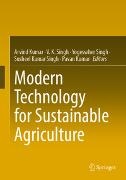Read more
Modern technology for sustainable agriculture is based primarily on three platforms, namely science, innovation and spatial technologies. These are considered as the three pioneer pillars of nation building. Spatial technologies play a vital role in improving soil quality, reducing the waste of water during irrigation and sharing agricultural information with farmers. With the help of terrestrial, aquatic, and aerial sensors, satellites and surveillance equipment, a large volume of geo-spatial data from diverse sources is collected, analyzed, and utilized for smart farming and shielding of crops. During last five decades, agricultural research and extension has focused on the development of higher productivity of crop varieties, increased fertilizer use and other production technologies. These have enabled the farmers to grow more food, but at the same time it over exploited the resources and resulted in decreasing farm productivity and profitability. To tackle such problems, harmonious use of inputs through integration of various land- based enterprises and their compounded responses needs further attention to make the agriculture more productive, profitable and sustainable. Many technologies have been identified to support sustainable use of resources and facilities, including Natural Resource Management (NRM), Resource Conservation Technologies (RCTs), Integrated Farming System (IFS), Integrated Crop Management (ICM), Integrated Nutrient Management (INM), protected cultivation practices, secondary agricultural practices and post-harvest technologies.
List of contents
1. Linking of the past, present and future scenarios of soil.- 2. Land use planning based agriculture for better soil management.- 3. Soil mapping.- 4. Use of information technology in soil management.- 5. Cropping system based soil management.- 6. Presence scenario of water availability and its resources.- 7. Water recycling for irrigation practices.- 8. Methods of increasing water productivity.- 9. Sensors based irrigation for increasing crop and water productivity.- 10. Water budgeting based crop planning.
Summary
Modern technology for sustainable agriculture is based primarily on three platforms, namely science, innovation and spatial technologies. These are considered as the three pioneer pillars of nation building. Spatial technologies play a vital role in improving soil quality, reducing the waste of water during irrigation and sharing agricultural information with farmers. With the help of terrestrial, aquatic, and aerial sensors, satellites and surveillance equipment, a large volume of geo-spatial data from diverse sources is collected, analyzed, and utilized for smart farming and shielding of crops. During last five decades, agricultural research and extension has focused on the development of higher productivity of crop varieties, increased fertilizer use and other production technologies. These have enabled the farmers to grow more food, but at the same time it over exploited the resources and resulted in decreasing farm productivity and profitability. To tackle such problems, harmonious use of inputs through integration of various land- based enterprises and their compounded responses needs further attention to make the agriculture more productive, profitable and sustainable. Many technologies have been identified to support sustainable use of resources and facilities, including Natural Resource Management (NRM), Resource Conservation Technologies (RCTs), Integrated Farming System (IFS), Integrated Crop Management (ICM), Integrated Nutrient Management (INM), protected cultivation practices, secondary agricultural practices and post-harvest technologies.

